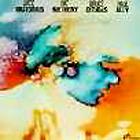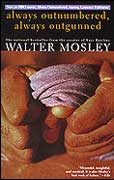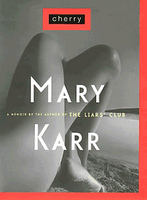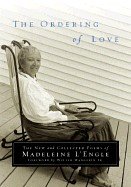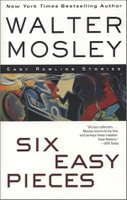
Walter Mosely's Six Easy Pieces (2003) is another novel told through short stories, this time involving his long-time character Easy Rawlins. Easy is dealing with the loss of his best friend Mouse, and doing so isn't made simpler for him by the questions he has to encounter, one of which is whether or not Mouse is actually dead. He also is unsure whether his beautiful girlfriend is faithful to him, and though he is trying to just do his job as head custodian at Sojourner Truth High School, he keeps getting pulled back to the detective work in the L.A. streets where it is hard to tell who is innocent. Most of these stories were originally published in paperback editions of other books, and each stands alone just fine. However the connected narrative, for me, is much more satisfying.
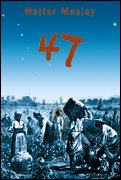
47 (2005) is Mosely's first attempt at the young adult novel, and it is a winner. Here Mosely tells the story of 47, a young man who is destined to be a force for emancipation, not only for the slaves on his master's plantation, but also for those bound by the mindset of slavery. 47 meets another slave named Tall John who speaks and acts as if from another planet and who helps 47 to realize his real identity, not his name, but who he really is and is meant to be.
This book is one of the most fascinating novels for young people I have read in years. The deft weaving of history and science fiction is masterful, but what I think is most important is how Mosely provides his readers an idea of mental slavery that engages his characters. This is a powerful, uplifting story. If it does not find its way onto high school reading lists, then something is seriously wrong.
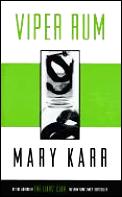 My main complaint about Mary Karr's Viper's Rum (1998) is that it is too short. There is only 45 pages of poems plus the inclusion of Karr's now infamous essay "Against Decoration." But what is here is certainly worth reading. I did find myself a little put off by a couple of the poems. Well, put off isn't really accurate. The word "squeamish" comes to mind, but that might not be quite right either. Poems like "The Wife of Jesus Speaks" and "The Invention of God in a Mouthful of Milk" are likely going to make the more conservative reader uncomfortable, but careful reading will, I believe, show these to be as thoughtful and as inspiring as the rest of the collection. I did not find myself as moved as I did with Sinners Welcome; however, this volume has plenty to recommend it.
My main complaint about Mary Karr's Viper's Rum (1998) is that it is too short. There is only 45 pages of poems plus the inclusion of Karr's now infamous essay "Against Decoration." But what is here is certainly worth reading. I did find myself a little put off by a couple of the poems. Well, put off isn't really accurate. The word "squeamish" comes to mind, but that might not be quite right either. Poems like "The Wife of Jesus Speaks" and "The Invention of God in a Mouthful of Milk" are likely going to make the more conservative reader uncomfortable, but careful reading will, I believe, show these to be as thoughtful and as inspiring as the rest of the collection. I did not find myself as moved as I did with Sinners Welcome; however, this volume has plenty to recommend it.









